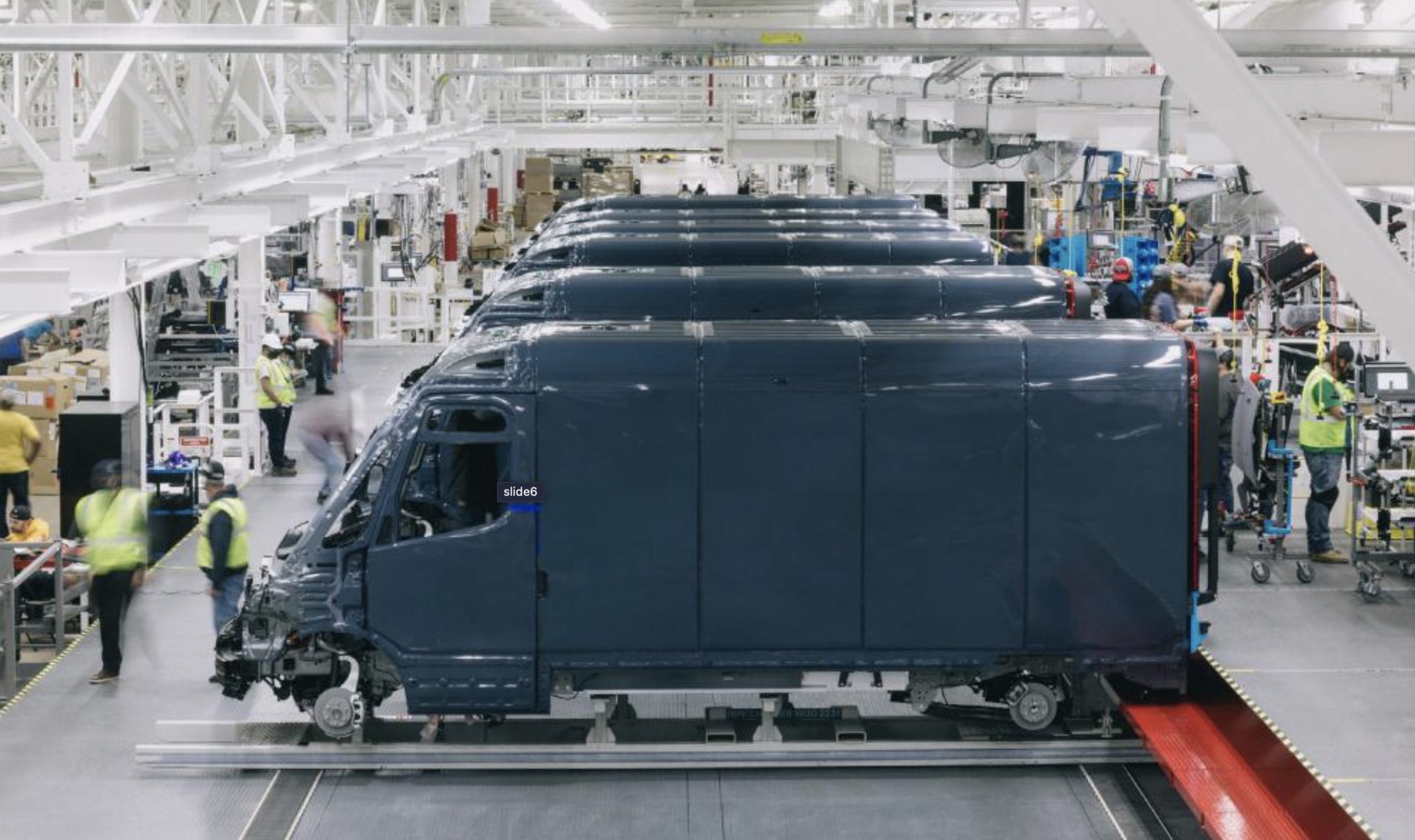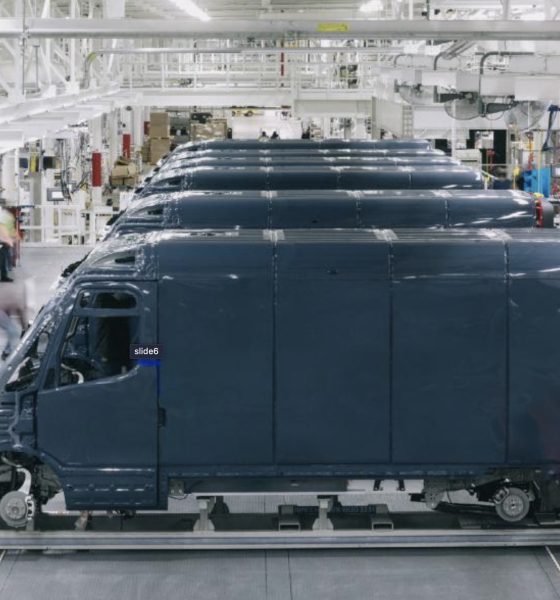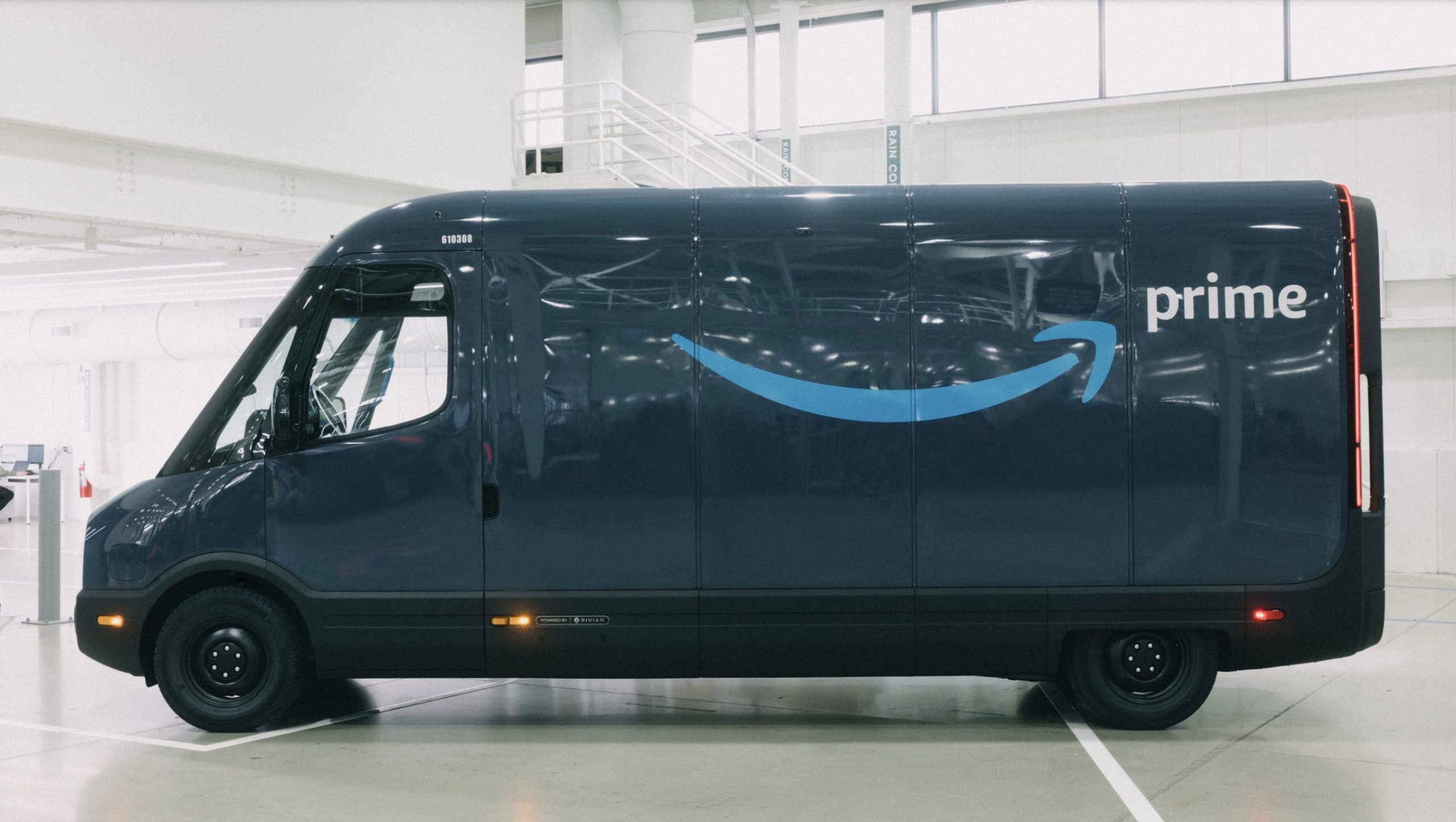

Investor's Corner
How Rivian’s deal with Mercedes bolsters the EV maker’s long-term outlook
After Rivian Automotive (NASDAQ: RIVN) struck a deal with Mercedes-Benz last week for a strategic partnership and joint production effort of electric delivery vans, analysts are explaining how the move could help bolster the EV maker’s long-term outlook.
Last week, Rivian and Mercedes-Benz announced they would build all-electric delivery vans for the European market, where the EV company has yet to deliver a vehicle. In the United States, Rivian is currently offering customers the R1T pickup, but its EDV, or Electric Delivery Van, is one of the main focal points of the company’s early production.
In 2019, Rivian found itself a worthy investor and supporter in Amazon, which ordered 100,000 EDV units from the company. Deliveries began this year after extensive pilot programs yielded adequate data for a controlled launch in several cities. The EDV is an early signal of success for Rivian as it struggles to ramp production of the R1T and R1S due to parts shortages. Supply chain issues have been cited by Rivian in the past for delayed production and delivery dates.
However, the EDV’s arrival in Europe and Rivian’s partnership with Mercedes-Benz is bolstering the company’s long-term future, which has been not in doubt but definitely questioned by those with extensive knowledge of the industry. While armchair commentators have speculated that Rivian and other EV startups would not survive the early days of production, Tesla CEO Elon Musk advised the automaker to cut costs and ramp production at its first factory before expanding with new manufacturing facilities within the United States.
The EDV partnership with Mercedes gives Rivian a new bit life, according to numerous analysts. The electric van sector, while predominately controlled by Ford, is still widely up for grabs due to relatively low volumes. While the United States may have a higher concentration of these vehicles, Europe is still lacking sustainable commercial logistics solutions, and Rivian’s EDV product is suitable for the market, Dan Ives of Wedbush explained (via MarketWatch):
“We view this as a smart strategic move by Rivian to penetrate Europe while ramping production of the EDV platform to meet its long-term growth and profitability targets. We believe Rivian is primed to capture the massive influx of current and future EV demand, capitalizing on a unique global TAM from a core engineering and design perspective along with the Amazon commercial relationship has the potential to be a major EV stalwart over the next decade. Production is improving to at least hit the 25k deliveries this year and we have confidence that customer reservations continue to increase into FY23 with the stage set for a seminal year ahead.”
Ives has a $45 price target on Rivian and an ‘Outperform’ rating on the stock.
Credit: Rivian
Additionally, Ben Kallo of Baird Securities has also said the Rivian deal will help the company solve scalability with the production portion of the deal occurring at an existing Mercedes-Benz facility in Europe. Kallo also said that Rivian has a chance to “mount a challenge to Tesla’s current dominance” in the coming years as it continues to address its total scalable market through strategic partnerships like this one:
“With few details disclosed regarding the proposed partnership, the total addressable market for electric vans is still vague. Despite a lack of clarity, RIVN is set to benefit from Mercedes’ scale while lending from its strong technology position. As the world accelerates its shift to EVs, Rivian has a solid opportunity to mount a challenge to Tesla’s current dominance.”
Kallo and Biard hold a $51 price target with an ‘Outperform’ rating on the stock. At the time of writing, shares were down just 1.6 percent on the day, but have surged over 14.5 percent since the partnership was announced last week.
Disclosure: Joey Klender is not a RIVN shareholder.
I’d love to hear from you! If you have any comments, concerns, or questions, please email me at joey@teslarati.com. You can also reach me on Twitter @KlenderJoey, or if you have news tips, you can email us at tips@teslarati.com.

Elon Musk
SpaceX IPO could push Elon Musk’s net worth past $1 trillion: Polymarket
The estimates were shared by the official Polymarket Money account on social media platform X.

Recent projections have outlined how a potential $1.75 trillion SpaceX IPO could generate historic returns for early investors. The projections suggest the offering would not only become the largest IPO in history but could also result in unprecedented windfalls for some of the company’s key investors.
The estimates were shared by the official Polymarket Money account on social media platform X.
As noted in a Polymarket Money analysis, Elon Musk invested $100 million into SpaceX in 2002 and currently owns approximately 42% of the company. At a $1.75 trillion valuation following SpaceX’s potential $1.75 trillion IPO, that stake would be worth roughly $735 billion.
Such a figure would dramatically expand Musk’s net worth. When combined with his holdings in Tesla Inc. and other ventures, a public debut at that level could position him as the world’s first trillionaire, depending on market conditions at the time of listing.
The Bloomberg Billionaires Index currently lists Elon Musk with a net worth of $666 billion, though a notable portion of this is tied to his TSLA stock. Tesla currently holds a market cap of $1.51 trillion, and Elon Musk’s currently holds about 13% to 15% of the company’s outstanding common stock.
Founders Fund, co-founded by Peter Thiel, invested $20 million in SpaceX in 2008. Polymarket Money estimates the firm owns between 1.5% and 3% of the private space company. At a $1.75 trillion valuation, that range would translate to approximately $26.25 billion to $52.5 billion in value.
That return would represent one of the most significant venture capital outcomes in modern Silicon Valley history, with a growth of 131,150% to 262,400%.
Alphabet Inc., Google’s parent company, invested $900 million into SpaceX in 2015 and is estimated to hold between 6% and 7% of the private space firm. At the projected IPO valuation, that stake could be worth between $105 billion and $122.5 billion. That’s a growth of 11,566% to 14,455%.
Other major backers highlighted in the post include Fidelity Investments, Baillie Gifford, Valor Equity Partners, Bank of America, and Andreessen Horowitz, each potentially sitting on multibillion-dollar gains.
Elon Musk
Elon Musk hints Tesla investors will be rewarded heavily
“Hold onto your Tesla stock. It’s going to be worth a lot, I think. That’s my bet,” Musk said.

Elon Musk recently hinted that he believes Tesla investors will be rewarded heavily if they continue to hold onto their shares, and he reiterated that in a new interview that the company released on its social accounts this week.
Musk is one of the most successful CEOs in the modern era and has mammothed competitors on the Forbes Net Worth List over the past year as his holdings in his various companies have continued to swell.
Tesla investors, especially those who have been holding shares for several years, have also felt substantial gains in their portfolios. Over the past five years, the stock is up over 78 percent. Since February 2019, nearly seven years ago to the day, the stock is up over 1,800 percent.
Musk said in the interview:
“Hold onto your Tesla stock. It’s going to be worth a lot, I think. That’s my bet.”
Elon Musk in new interview: “Hold on to your $TSLA stock. It’s going to be worth a lot, I think. That’s my bet.” pic.twitter.com/cucirBuhq0
— Sawyer Merritt (@SawyerMerritt) February 26, 2026
It’s no secret Musk has been extremely bullish on his own companies, but Tesla in particular, because it is publicly traded.
However, the company has so many amazing projects that have an opportunity to revolutionize their respective industries. There is certainly a path to major growth on Wall Street for Tesla through its various future projects, including Optimus, Cybercab, Semi, and Unsupervised FSD.
- Optimus (Tesla’s humanoid robot): Musk has discussed its potential for tasks like childcare, walking dogs, or assisting elderly parents, positioning it as a massive long-term driver of company value.
- Cybercab (Tesla’s robotaxi/autonomous ride-hailing vehicle): a fully autonomous vehicle geared specifically for Tesla’s ride-sharing ambitions.
- Semi (Tesla’s electric truck, with mentions of expansion, like in Europe): brings Tesla into the commercial logistics sector.
- Unsupervised FSD (Full Self-Driving software achieving full autonomy without human supervision): turns every Tesla owner’s vehicle into a fully-autonomous vehicle upon release
These projects specifically are some of the highest-growth pillars Tesla has ever attempted to develop, especially in Musk’s eyes, as he has said Optimus will be the best-selling product of all-time.
Many analysts agree, but the bullish ones, like Cathie Wood of ARK Invest, are perhaps the one who believes Tesla has incredible potential on Wall Street, predicting a $2,600 price target for 2030, but this is not even including Optimus.
She told Bloomberg last March that she believes that the project will present a potential additive if Tesla can scale faster than anticipated.
Elon Musk
Tesla stock gets latest synopsis from Jim Cramer: ‘It’s actually a robotics company’
“Turns out it’s actually a robotics and Cybercab company, and I want to buy, buy, buy. Yes, Tesla’s the paper that turned into scissors in one session,” Cramer said.

Tesla stock (NASDAQ: TSLA) got its latest synopsis from Wall Street analyst Jim Cramer, who finally realized something that many fans of the company have known all along: it’s not a car company. Instead, it’s a robotics company.
In a recent note that was released after Tesla reported Earnings in late January, Cramer seemed to recognize that the underwhelming financials and overall performance of the automotive division were not representative of the current state of affairs.
Instead, we’re seeing a company transition itself away from its early identity, essentially evolving like a caterpillar into a butterfly.
The narrative of the Earnings Call was simple: We’re not a car company, at least not from a birds-eye view. We’re an AI and Robotics company, and we are transitioning to this quicker than most people realize.
Tesla stock gets another analysis from Jim Cramer, and investors will like it
Tesla’s Q4 Earnings Call featured plenty of analysis from CEO Elon Musk and others, and some of the more minor details of the call were even indicative of a company that is moving toward AI instead of its cars. For example, the Model S and Model X will be no more after Q2, as Musk said that they serve relatively no purpose for the future.
Instead, Tesla is shifting its focus to the vehicles catered for autonomy and its Robotaxi and self-driving efforts.
Cramer recognizes this:
“…we got results from Tesla, which actually beat numbers, but nobody cares about the numbers here, as electric vehicles are the past. And according to CEO Elon Musk, the future of this company comes down to Cybercabs and humanoid robots. Stock fell more than 3% the next day. That may be because their capital expenditures budget was higher than expected, or maybe people wanted more details from the new businesses. At this point, I think Musk acolytes might be more excited about SpaceX, which is planning to come public later this year.”
He continued, highlighting the company’s true transition away from vehicles to its Cybercab, Optimus, and AI ambitions:
“I know it’s hard to believe how quickly this market can change its attitude. Last night, I heard a disastrous car company speak. Turns out it’s actually a robotics and Cybercab company, and I want to buy, buy, buy. Yes, Tesla’s the paper that turned into scissors in one session. I didn’t like it as a car company. Boy, I love it as a Cybercab and humanoid robot juggernaut. Call me a buyer and give me five robots while I’m at it.”
Cramer’s narrative seems to fit that of the most bullish Tesla investors. Anyone who is labeled a “permabull” has been echoing a similar sentiment over the past several years: Tesla is not a car company any longer.
Instead, the true focus is on the future and the potential that AI and Robotics bring to the company. It is truly difficult to put Tesla shares in the same group as companies like Ford, General Motors, and others.
Tesla shares are down less than half a percent at the time of publishing, trading at $423.69.








